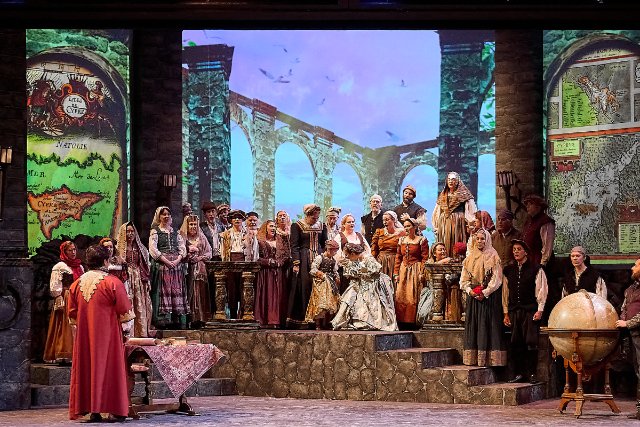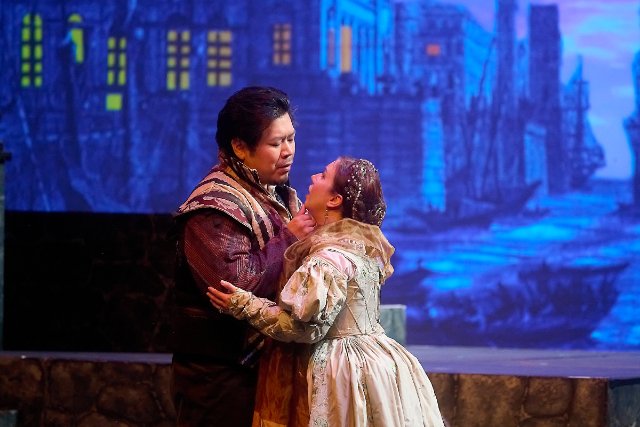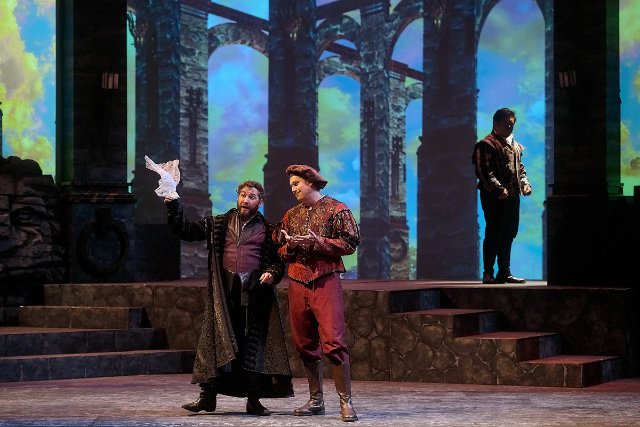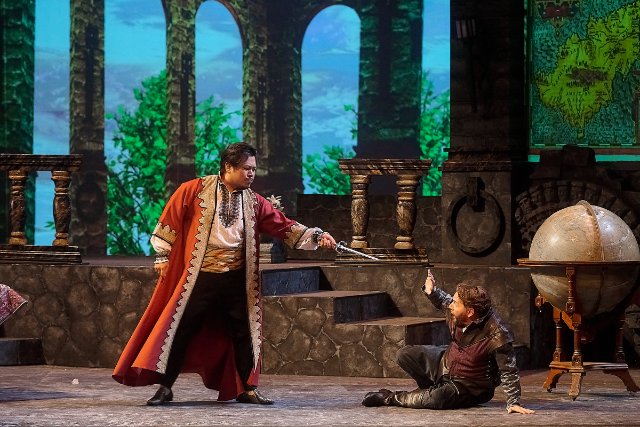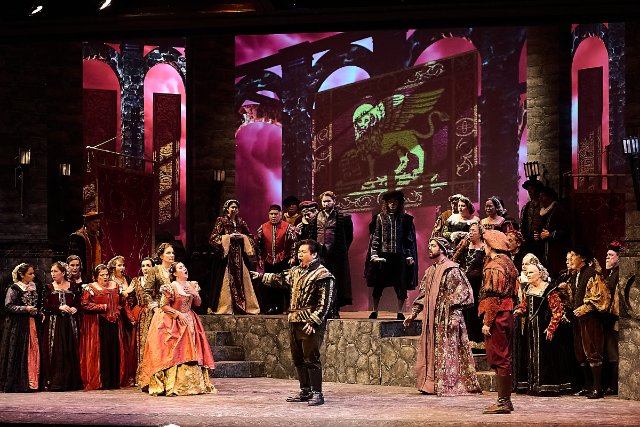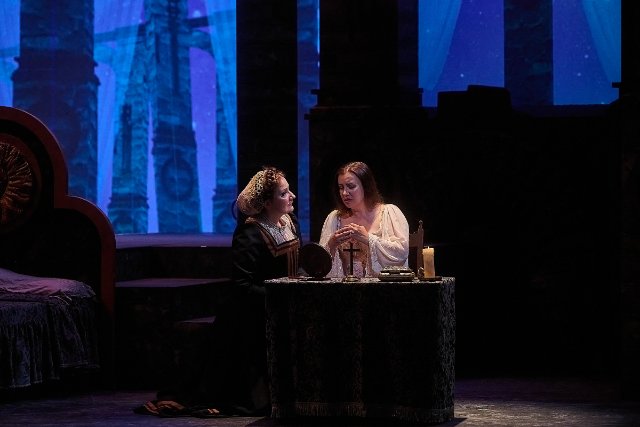Otello
West Bay Conquers Notoriously Difficult Verdi Masterpiece
By: Victor Cordell - May 26, 2025
Indisputably one of the brightest stars in the opera firmament, Giuseppe Verdi’s operas remain among the most popular. While many endure in the canon, his most performed include the great trio from his rich middle period, La Traviata, Il Trovatore, and Rigoletto, plus the later Aida. Yet critics most often cite Otello as his crowning achievement. West Bay Opera has courageously gambled on this notoriously difficult opera and has come up all aces. All of the creative elements from aural to visual contribute to a riveting and memorable production.
Blessed with stunningly beautiful music, gripping drama, and consummate tragedy, why is Otello not produced more often? Need we mention that while storyline and lyrics are often operas’ weak knees, Arrigo Boito’s libretto is considered, if anything, an improvement on its Shakespearean source material. The foremost impediment is the challenge of casting. The title role is deemed one of the most difficult in opera - one that tenors are advised not to try until they are in their own rich middle period because of the stress on the voice. Plus, Desdemona must command the audience through stunned silence with one of the most wrenching soliloquies in opera, a 12-minute virtuoso demand. Finally, Iago, a villain non-pareil, must possess a great bass-baritone range and versatile vocal style while acting with a sense of insidious evil.
Another resistance point starting with its 1887 origins is that Otello represents Verdi’s first adoption of Wagner’s notion of continuous music, with no stopping for applause, which Italian audiences rejected. But unlike Wagner’s later works, especially the Ring Cycle, Otello brims with wonderfully melodious self-contained set pieces. Wagner also adopted what is arguably a weakness in his music theory (and perhaps his own compositional ability), and that is the abandonment of ensembles of any sort. Happily, Otello abounds with captivating duets, the masterful double-duet (quartet, if you like) handkerchief scene, and a huge non-synchronous ensemble plus chorus (which plays a very active role) to close this production’s Act 2 that overflows with power and complexity.
The plot is uncomplicated. Otello, a Moorish general in Venice’s military, returns to Cyprus to victory celebrations in a tumultuous storm that foretells the human drama. His ensign, the duplicitous Iago, resents being passed over for a promotion that went to Cassio, and he vows revenge. By placing Desdemona’s handkerchief in Cassio’s quarters, he implicates both. Upon assuming betrayal, Otello strangles Desdemona, and then finding that she was innocent, impales himself. For those who may cry spoiler, the generally accepted rule is that it is okay to disclose spoilers to operas and classic literature in reviews, as the reader is expected to know them already.
From the bombastic opening to the tragic and intimate closing, West Bay’s production compels and manages the many hurdles along the way. The Byzantine Act 2 ensemble finale serves as a telltale. It could easily come out as mush, but Maestro José Luis Moscovich harnesses the orchestra, chorus, and principals, each into elevating their separate contributions.
John Kun Park imbues the title character with an appropriately grim countenance and single mindedness. Unfortunately, Otello is as decisive as he is gullible, and accepting Iago’s treachery as truth causes the tragedy. Park accomplishes the challenge of the role with an accurate and vigorous voice, if slightly muffled in tone in the high end of his range. He powers his way through the endless demands of the role. Perhaps his greatest moments are in the absolutely wonderous duet with Iago, “Si, pel ciel” in which he vows revenge on the accused dalliant lovers along with his vow for retribution, “Sangue! Sangue! Sangue!”
As Desdemona, Julia Behbudov brings a sterling voice and passion. She excels in the beautiful and reflective duet with Otello, “Già nella notte densa,” with cascades of crescendos, as well as in her extended signature soliloquy. As she contemplates death, she completely captures the audience with Desdemona’s willow song, the haunting lament (“Salce! Salce! Salce!”) with its delicacy, dramatic vocal turns, and chilling shriek, followed by her tender prayer “Ave Maria.”
But if Otello belongs to one player, it is Robert Balonek as the manipulative and treacherous Iago, who pulls Otello’s strings like a puppeteer. The large and encompassing role introduces one of the most iconic villains in opera, and Balonek endows it with every quality it deserves. We speak of actors chewing up the scenery, and if the concept could be applied to a voice, it would be to his. Rich, deep, and resonant, his exquisite dynamics can caress the graceful and stealthy yet explode with power. Balonek’s commanding voice towers with versatile highlights throughout, but perhaps most notably in his “Credo,” when he acknowledges his own depravity but disdains those who may be honest but inept. His body language and visual expressiveness with his smirks and sneers exhibits every bit of treacherous venom imaginable.
It is rare for a smaller opera company to take on an opera with the demands of Otello, much less produce an outcome as satisfying. In addition to the performers, artistic contributors deserve recognition as evident from the photos, starting with Stage Director Richard Harrell, plus Peter Crompton for set and projections, Daniele Ferguson for lighting, and Callie Floor for costumes. Otello deserves full support from the opera loving community on its closing weekend.
Otello, composed by Giuseppe Verdi and with libretto by Arrigo Boito based on the play Othello by William Shakespeare, is produced by West Bay Opera and is performed at Lucie Stern Theatre, 1305 Middlefield Road, Palo Alto, CA through June 1, 2025.

